Using HubSpot for Real Estate to Increase Growth & Productivity
Maximize growth and productivity with HubSpot for real estate and boost the chances of your success in real estate industry.
.png?format=webp&width=700&height=500&name=HubSpot%20for%20HealthCare%204%20(1).png)
Discover how HubSpot for healthcare industry is driving patient growth and improving their experiences
To enhance patient care while sustaining growth, healthcare businesses are continuously seeking groundbreaking tools and platforms to stay compliant. HubSpot - a versatile platform, can help accomplish the goals of any healthcare organization.
HubSpot, a versatile platform known for its effectiveness in various industries, is considered the right fit for healthcare organizations only when it comes to customer-facing departments. Healthcare providers can commit to patients’ well-being and navigate the evolving healthcare industry by exploring and employing HubSpot effectively.
Let's look at the features that a healthcare organization requires in a CRM and whether they are available in HubSpot or not.
| CRM Features Essential for Healthcare | Availability in HubSpot? |
| Reporting and Analytics |
✔️ |
| HIPAA Compliance | ❌ |
| Access Control | ✔️ |
| Document e-Signature | ✔️ |
| Task Assignment and Tracking | ✔️ |
| Follow-up Reminders | ✔️ |
| Staff Scheduling | ❌ |
| Mobile App for On-the-go Access | ✔️ |
| Vendor Contact Information | ✔️ |
| Laboratory Integration | ❌ |
| Pharmacy Integration | ❌ |
| Telehealth Integration | ✔️ |
| Remote Monitoring Integration | ❌ |
| Email Integration | ✔️ |
| SMS and Text Messaging | ✔️ |
| Custom Forms and Templates | ✔️ |
| Multichannel Communication | ✔️ |
| Patient Health Records (EHR) | ❌ |
| Appointment Scheduling | ✔️ |
| Referral Management | ❌ |
| Consent and Authorization Management | ❌ |
| Insurance Management | ❌ |
| Payment Processing | ✔️ |
| Waitlist Management | ❌ |
| Appointment Reminders | ✔️ |
| Patient Self-Service Portal | ✔️ |
| Patient Check-In and Check-Out | ✔️ |
| Patient Surveys | ✔️ |
| Complaints Resolution | ✔️ |
HubSpot seamlessly aligns with the critical requirements of the customer-facing teams in the healthcare industry but also has several limitations when it comes to specific healthcare needs and third-party tools are needed to manage these limitations. HubSpot has a rich array of features essential for enhancing marketing efficiency and fostering robust growth. The compatibility between HubSpot and healthcare is generally robust, covering a range of functionalities tailored to marketing needs. However, it's notable that some specific features are expected to exempt this rule.
To fully optimize the benefits of HubSpot for healthcare applications, it is recommended to establish objectives. If you are confronting any feature gap specific to healthcare, prioritize consulting with a HubSpot expert. They can help assess the feasibility of workarounds or provide you with effective alternative solutions.
The healthcare industry has transformed the way healthcare business functions with technology-driven solutions. By offering the latest tools and solutions it caters to the unique needs of marketing, sales, and customer support. HubSpot, a growth-centric platform, is renowned for its comprehensive suite of hubs that cater to critical healthcare operations.
There are many ways that healthcare businesses can use HubSpot to their marketing advantage. Healthcare providers can design individualized patient journeys using HubSpot's feature-rich marketing automation tools, from the first point of contact to the follow-up after treatment. Healthcare organizations can engage patients more successfully by segmenting patient data and delivering targeted content.
Creating engaging and informative content plays a pivotal role in the healthcare industry. Healthcare providers can publish content to attract organic traffic, educate patients, and establish authority using HubSpot’s blog builder, which operates as a user-friendly drag-and-drop editor, eliminating the need for coding. This intuitive tool empowers healthcare professionals to share valuable insights with ease.
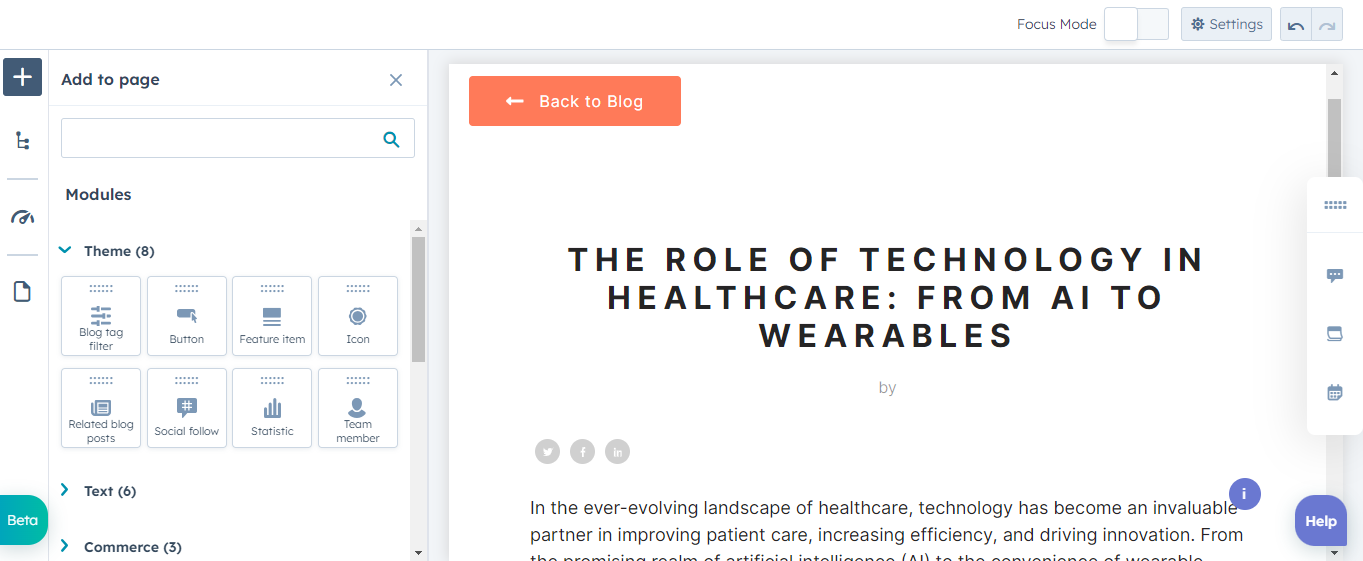
Automated email marketing involves predefined workflows to send targeted and personalized email messages to a segmented list of recipients. These emails are sent based on specific triggers or actions taken by individuals.
For instance, a Healthcare organization such as yours might use HubSpot automated emails to guide patients throughout their healthcare journey including timely appointment reminders, personalized patient communication, and post-visit surveys.

In today’s digital age, maintaining a strong online presence is vital. HubSpot’s social media management features let healthcare providers schedule posts, engage patients, and track their performances.
%20(1800%20x%201000%20px)%20(1575%20x%201000%20px)%20(1932%20x%201000%20px)%20(1316%20x%201000%20px)%20(1600%20x%201000%20px).webp?width=700&height=438&name=_(1400%20x%20800%20px)%20(1800%20x%201000%20px)%20(1575%20x%201000%20px)%20(1932%20x%201000%20px)%20(1316%20x%201000%20px)%20(1600%20x%201000%20px).webp)
Capturing essential data is the first step for patient engagement. HubSpot's Pop-up Forms enable healthcare organizations to collect patient information non-intrusively while streamlining lead generation and personalized care.

Efficient management of patient inquiries is essential for healthcare providers. That’s why, HubSpot's Sales Hub streamlines inquiry management, automates follow-ups, and tracks interactions to ensure the conversion of inquiries into active patients.
Let’s shed light on the common functionalities of HubSpot Sales Hub that can be profitable for any healthcare business.
Inquiry management is a process that healthcare organizations use to handle and respond to inquiries from patients and prospective clients. With the Inquiry Management feature of HubSpot, healthcare providers can organize, prioritize, and respond to patients' inquiries promptly and effectively.
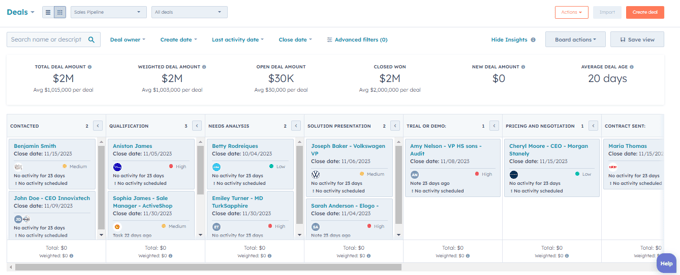
Contact management is a fundamental aspect of CRM that involves the organization and tracking of interactions and information related to individuals or entities with whom a business or organization engages. HubSpot’s contact management feature helps maintain comprehensive patient profiles. Healthcare organizations can centralize patient information to ensure efficient and personalized care.
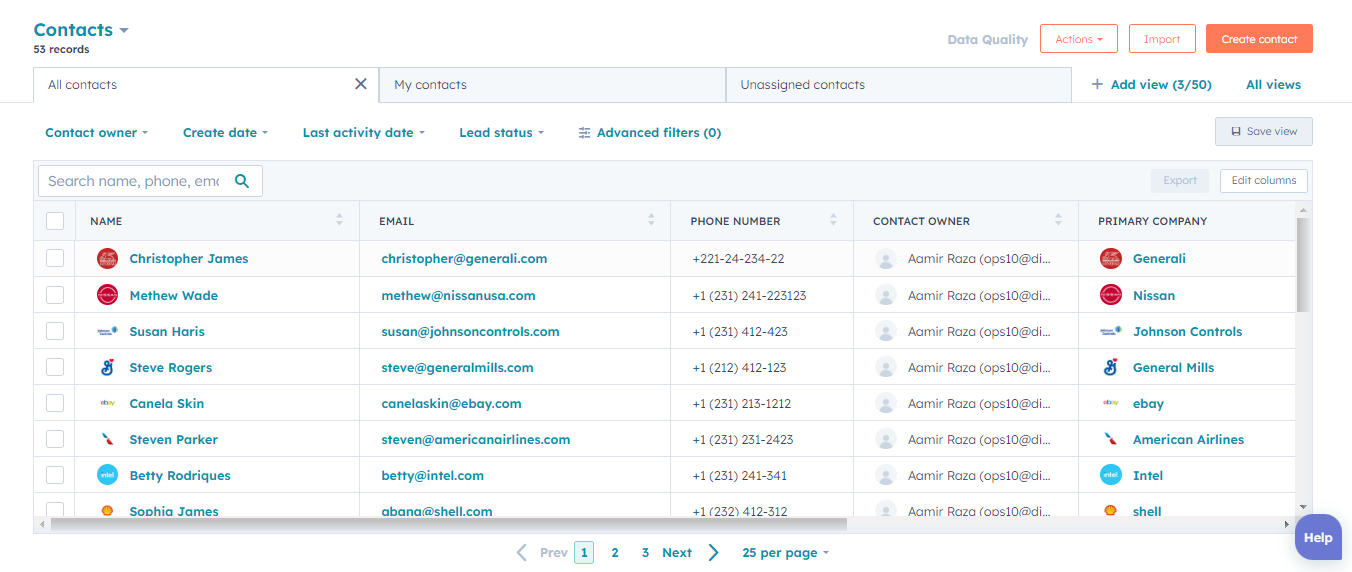
The sequence tool is a feature within HubSpot's suite of offerings, specifically designed to streamline and improve the sales process. Healthcare providers can automate patient engagement with personalized messages by utilizing HubSpot’s sequence tool. It helps send a series of personalized messages to patients at the right time throughout their healthcare journey.
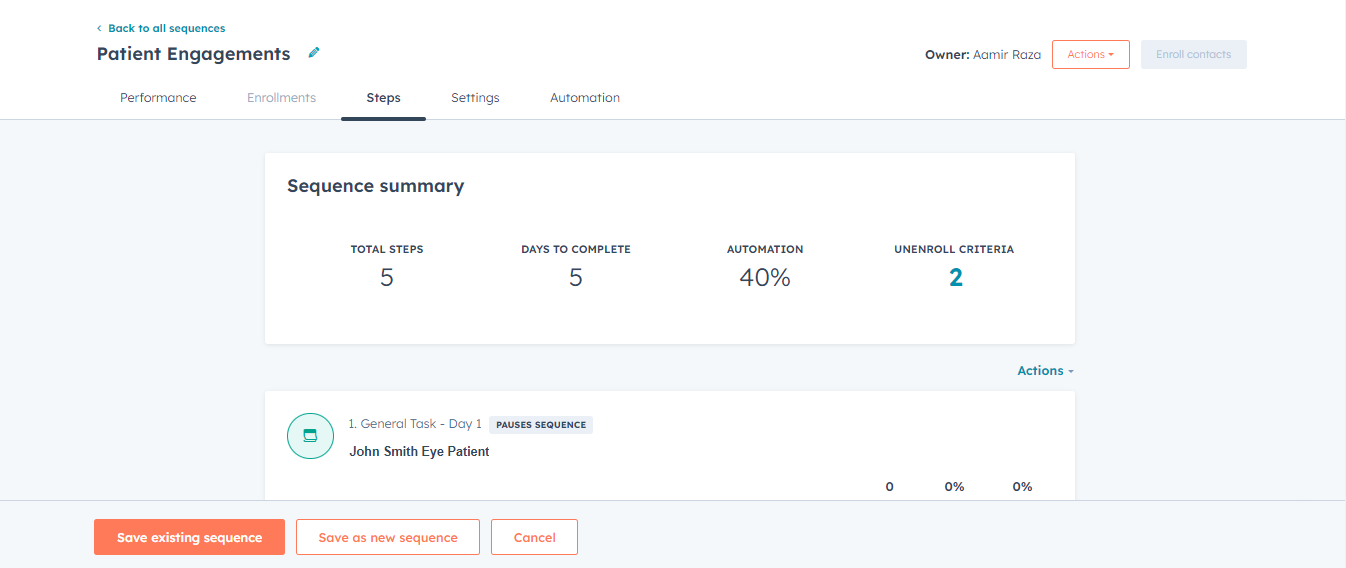
Playbooks are a structured set of guidelines, strategies, and actions that healthcare professionals follow to standardize and optimize specific processes and interactions.
HubSpot's playbook feature can be used by a healthcare organization to streamline telehealth appointment scheduling. By creating interactive content cards within contact records, staff can guide patients through the process of setting up and preparing for virtual medical consultations.
This ensures a smooth patient experience, reduces scheduling errors, and increases the adoption of telemedicine services, ultimately improving healthcare access and efficiency. HubSpot’s playbooks guarantee an effective approach to patient interactions and give them the best experience.
Only documents that are specifically related to sales may be kept within HubSpot. It's important to remember that, in accordance with HIPAA compliance regulations, it is strictly forbidden for any documents that are directly related to a patient's medical and health records to be secured within the platform.
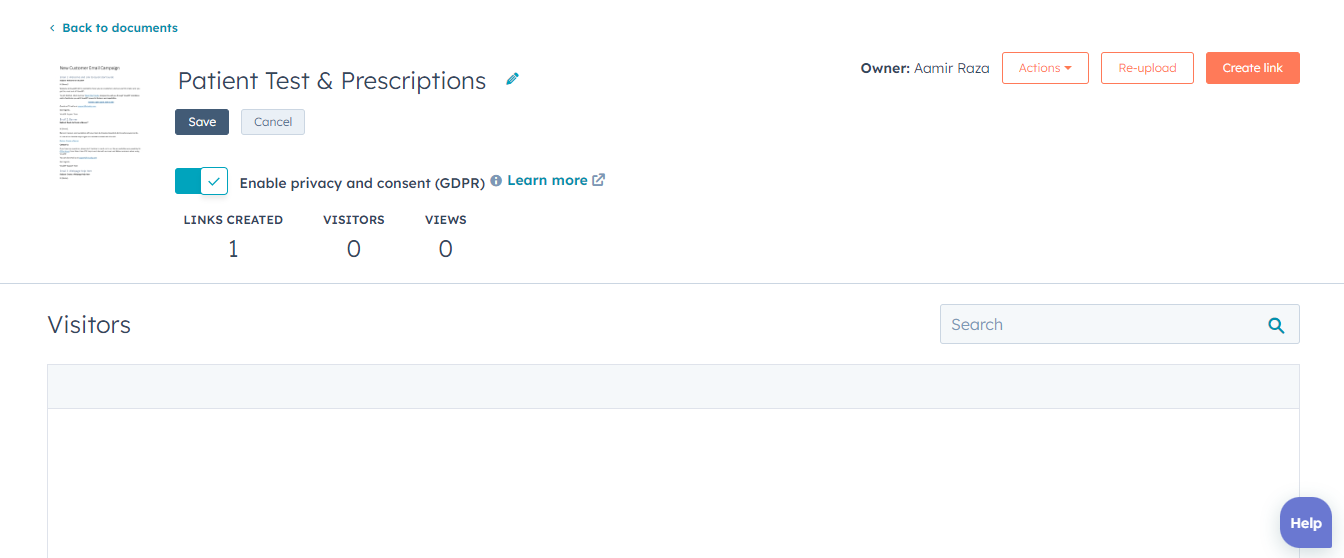
HubSpot’s quote tool helps healthcare providers generate and manage quotes for medical services efficiently. It also simplifies the billing and payment process for patients, improving the financial aspects of healthcare operations.

In healthcare, patient satisfaction is paramount. Healthcare providers can streamline operations and enhance patient satisfaction by leveraging the features of HubSpot’s Service Hub specific to healthcare needs.
Healthcare organizations can efficiently manage patient inquiries and issues with HubSpot's ticket routing feature. It assigns tickets to the appropriate individuals or teams to ensure faster resolution and a seamless patient experience.
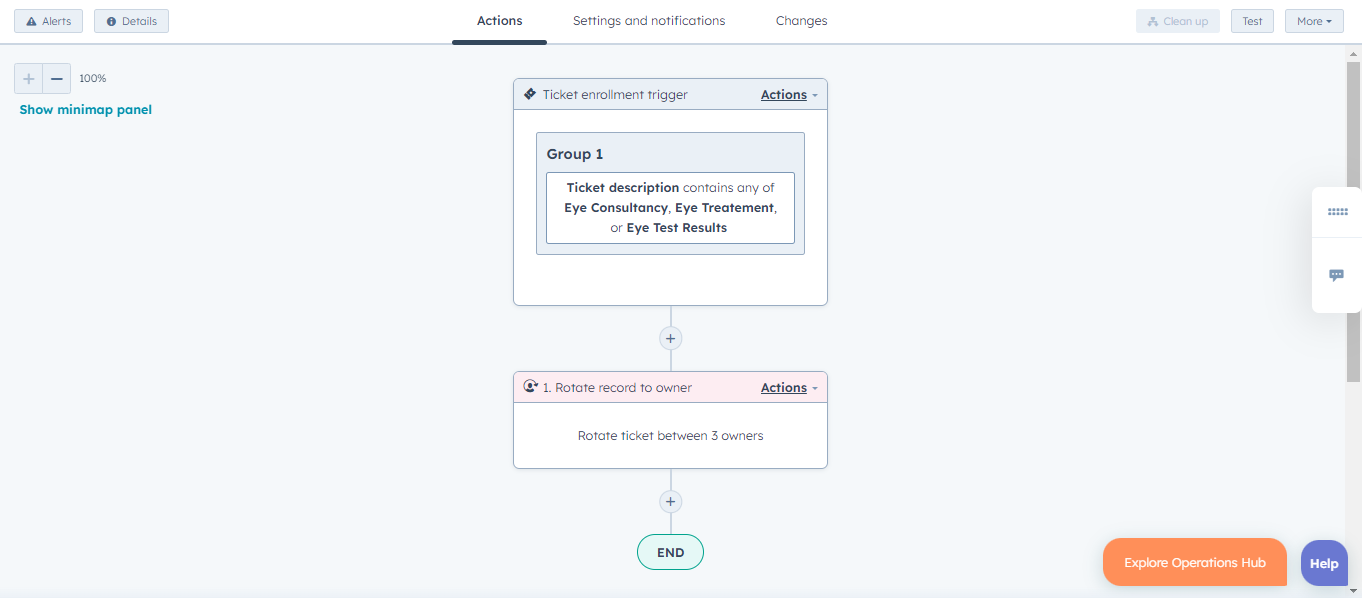
HubSpot’s feedback tool enables healthcare providers to gather valuable patient feedback. It further helps analyze insights to continuously improve healthcare services, ensuring that patients’ needs and expectations are met precisely.
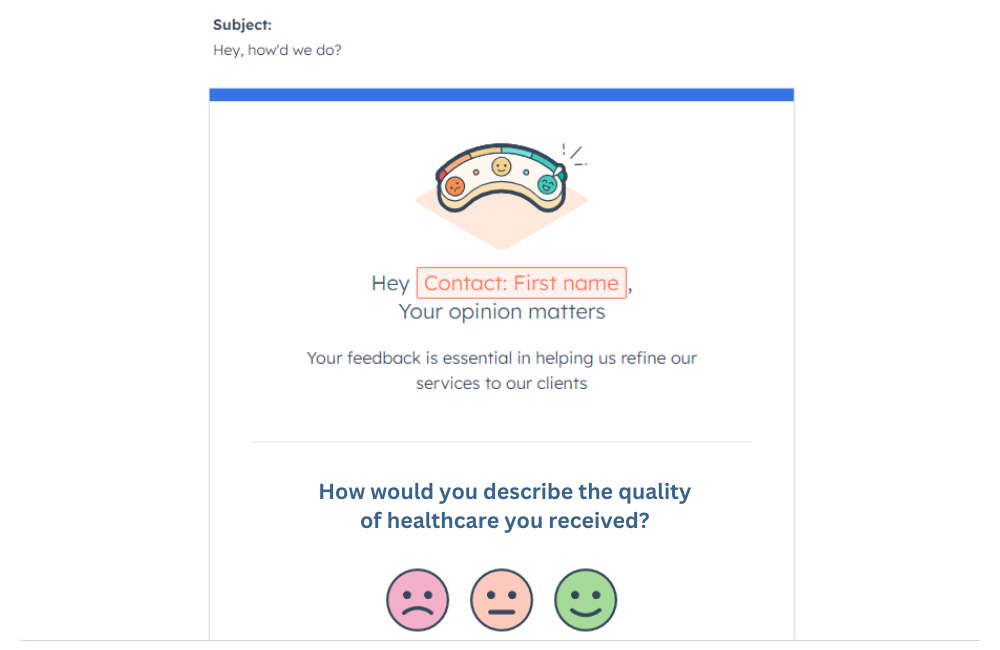
HubSpot's Content Management System for healthcare offers a user-friendly platform to create and manage the online presence of healthcare organizations. Its intuitive interface and robust features ensure that the websites are informative, optimized, and engaging for patient engagement.
HubSpot's Drag-and-Drop Editor is a tool designed to simplify content creation for healthcare organizations. Healthcare providers can effortlessly design and update web pages, using the drag-and-drop editor in HubSpot. There’s also no need for technical skills like coding.
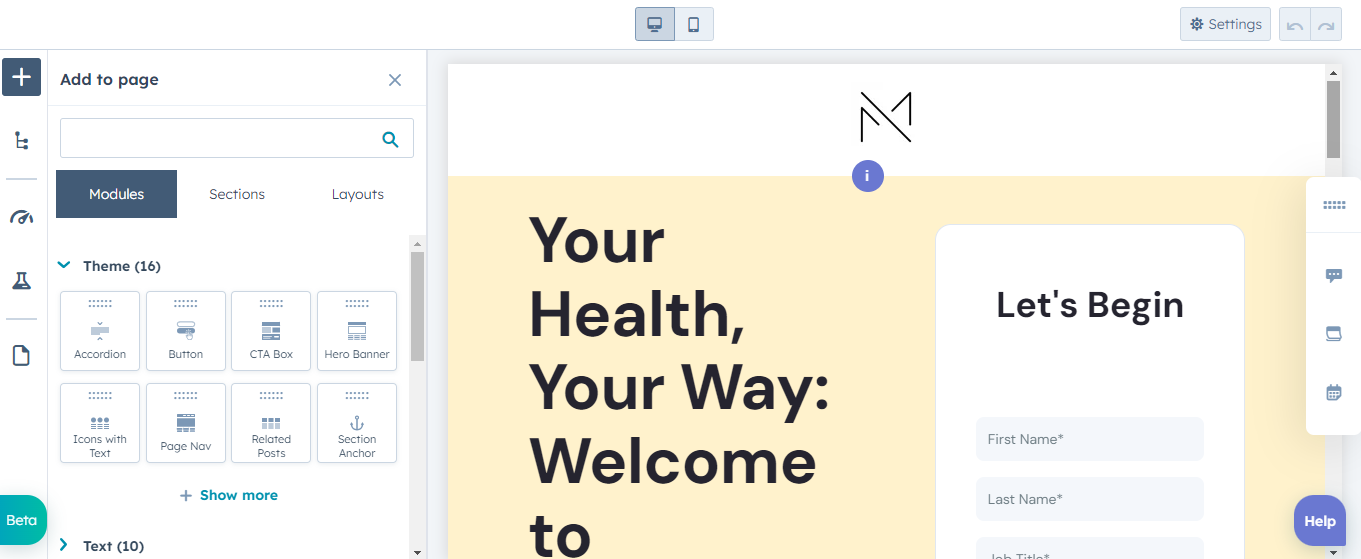
Healthcare organizations can optimize their content for search engines and drive organic traffic with HubSpot’s SEO software. Furthermore, patients can find relevant healthcare information and services as well using this feature.
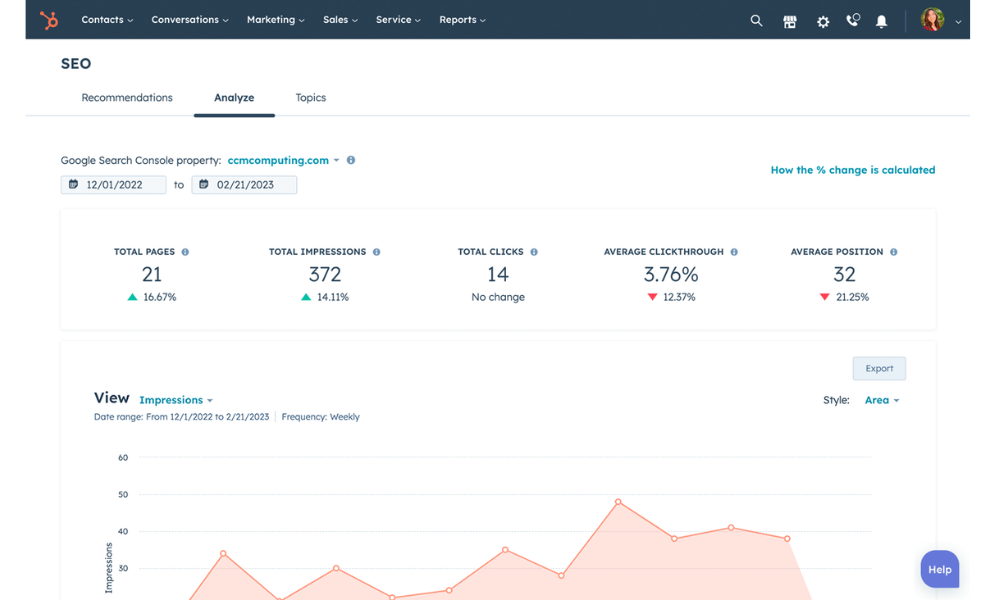
Credits: HubSpot
Landing pages are independent websites designed with a specific marketing campaign or goal in mind. They are a vital component of the digital marketing toolkit because they are made to collect visitor data via lead generation forms.
Healthcare providers can create conversion-focused landing pages to capture patient leads by leveraging HubSpot’s landing page feature. This can help capture patient leads, drive patient engagement, and promote specific healthcare services.
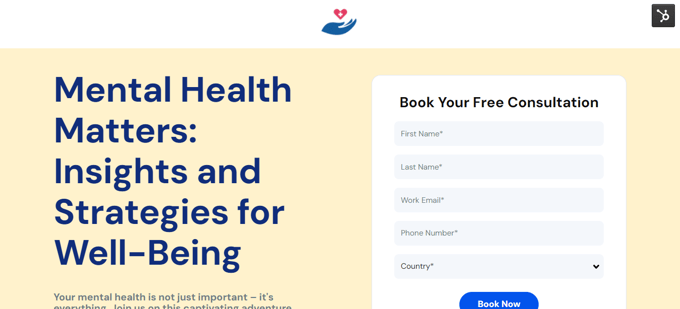
Indeed, HubSpot offers an array of valuable features to healthcare organizations. Apart from experiencing its plenty of benefits, healthcare providers should be aware of its limitations as well. Two of the significant limitations of HubSpot for Healthcare are listed below:
Despite being a flexible platform for sales, marketing, and customer service, HubSpot does not adhere to HIPAA regulations. It makes it unsuitable for handling patient-related tasks like storing medical histories, monitoring current medical conditions, or managing prescriptions, especially for US-based healthcare providers.
It's crucial to keep in mind that HubSpot should only be used for non-healthcare-related tasks, with a focus on enhancing sales, marketing, and servicing operations within the healthcare sector.
HubSpot may not encompass all the specific patient and insurance management features required by healthcare organizations. Patient and insurance management in healthcare can be highly complex, involving tasks such as patient record management, claims processing, and insurance verification.
It's important to note that HubSpot's main focus is on marketing, sales, and customer service. However, it can help with certain aspects of patient management and communication, but it may not provide all the specialized tools needed to manage it.
The brilliant part is that healthcare organizations may integrate HubSpot with specialized healthcare systems to bridge any feature gaps. Evaluate the needs of the organization and ensure that the chosen solutions work seamlessly to meet patient and insurance management requirements.
Healthcare providers may implement appropriate measures to address these limitations after carefully assessing their needs.
HubSpot holds significant potential to transform the healthcare industry with the practices of patient care and driving growth. It offers tools and features aligned with the unique needs of healthcare organizations. By harnessing the full potential of HubSpot’s features, healthcare providers may enhance patient engagement, optimize growth strategies, and streamline operations. However, healthcare organizations must consider additional solutions for specific patient and insurance management features while minding HIPAA compliance.

Maximize growth and productivity with HubSpot for real estate and boost the chances of your success in real estate industry.

Explore the potential of HubSpot for financial services in our complete guide. Explore use cases and limitations of HubSpot in the financial services...

Unlock the full potential of HubSpot for law firms with our ultimate guide. Streamline marketing, improve sales, and boost client engagement...